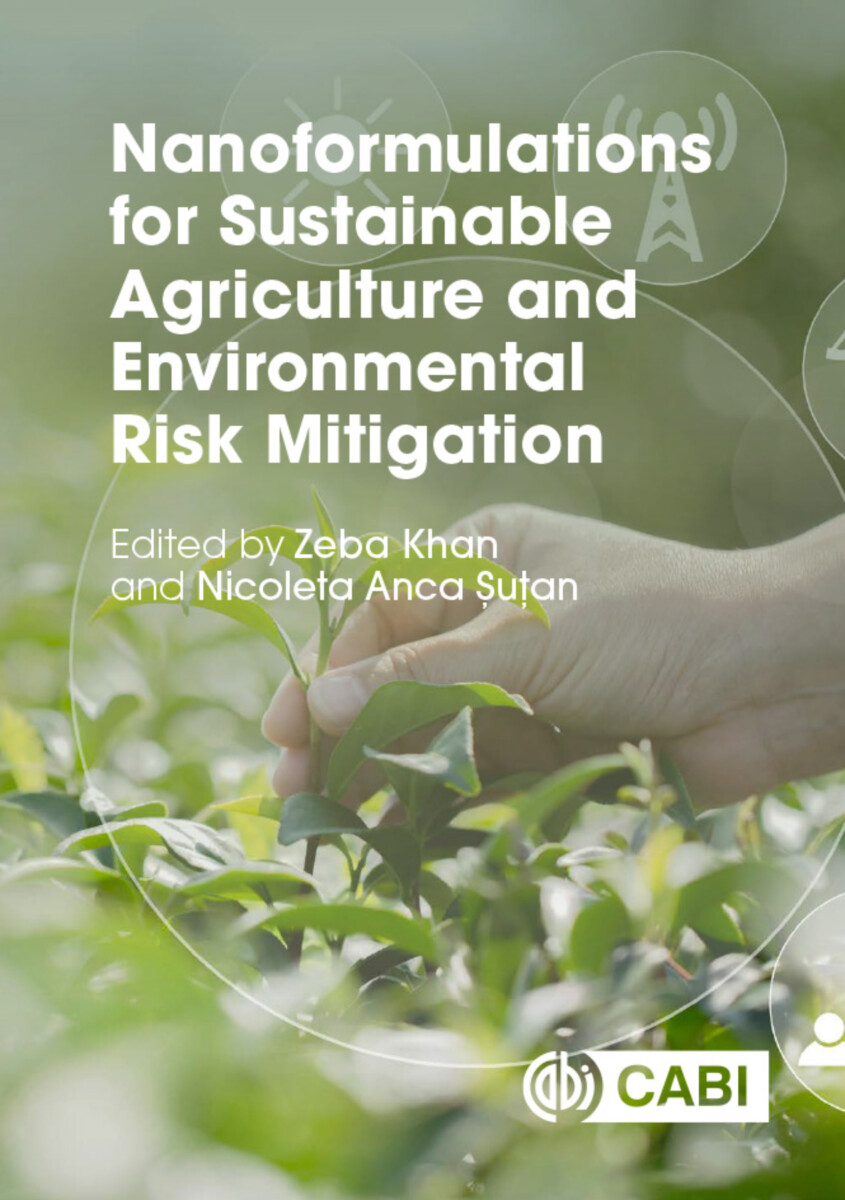Nanoformulations for Sustainable Agriculture and Environmental Risk Mitigation
- Publisher
CABI - Published
8th September 2023 - ISBN 9781800623071
- Language English
- Pages 240 pp.
- Size 6" x 9"
Nanotechnology research and its application in agriculture has become a major focus in recent years. Nanoformulations offer the possibility to develop more efficient and less damaging agrochemicals in the environment. Smart delivery systems for nanosensors, molecules that can help to detect biotic or abiotic stresses before they can affect production, are being developed and applied. Nanotechnology also provides new techniques for genetic manipulation and plant breeding. The use of nanoformulations in agriculture is increasingly being used to enhance food values, reduce agricultural inputs, improve nutrient contents and create a longer shelf life for many products. Nanotechnology is also being applied to many aspects of food security, disease treatment, new tools for pathogen detection, effective delivery systems and packaging materials. All of these applications are supposed to assist in addressing the needs of a growing population, and help in mitigating the effects of climate change and other ecological disturbances.
Written by an international team of experts from across this broad discipline, this book highlights new applications of these nanoforms in the field of agricultural science. It is essential reading for graduate students, researchers and practitioners involved in the application of nanotechnology in agriculture. The book:
- examines the role of nano-formulations in crop yield improvement whilst reducing reliance on chemical fertilizers and pesticides;
- covers specially enabled delivery systems for the release of nanoformulations, field-sensing systems to monitor environmental stresses, and improvement of plant traits against environmental stress and diseases;
- is unambiguous, lucid, scientific and precise, with chapters supplemented by ample illustration and case studies to help clarify and summarize key points throughout.
1. Agricultural nanotechnologies: current scenario and future implications for global food security—Gheorghe Cristian Popescu, and Monica Popescu.
2. Nanoformulation synthesis and mechanisms of interactions with biological systems—Denisa Stefania Vîlcoci, Nicoleta Anca Sutan, Oana Alexandra Draghiceanu, Liliana Cristina Soare, and Georgiana Cîrstea.
3. Nanoemuslion formulations for food processing and enhancing nutritional quality and shelf life of food—Daniela Nicuta, Ana-Maria Rosu, and Roxana-Elena Voicu.
4. Smart Nanodelivery Systems and Nanoformulations for Delivering Chemicals and DNA into Plants—Khairul Anwar Ishak and Rauzah Hashim.
5. Nano-formulations and Nano-enabled Products in Mitigating the Risk Associated with the Current use of Agrochemicals—K.G. Kaushani, and Gayan Priyadarshana.
6. Nanoformulations of Agrochemicals for Applying Pesticides and Fertilizers for Crop Improvement—Yehia A. Osman, Eladl Eltanahy, Amany Saad Hegazy, and Ahmed A. Razak.
7. Role and application of nanosensors in crop protection for disease identification—Anda Maria Baroi, Camelia Ungureanu, Mirela Florina Calinescu, Diana Vizitiu, Ionela – Daniela Sardarescu (Toma), Alina Ortan, Radu Claudiu Fierascu, and Irina Fierascu.
8. Nanomaterials for postharvest management and value addition—Khaled Sayed-Ahmed and Yasser M. Shabana.
9. Nanotechnology for Precision Farming and Smart Delivery—Gayanath Thiranagama, Dilki Jayathilaka, Chanaka Sandaruwan, and Nilwala Kottegoda
10. Health, Safety and Environmental Management and Risk Mitigation of Nanomaterials—Codruța Mihaela Dobrescu, Leonard Magdalin Dorobăț, and Monica Angela Neblea
Zeba Khan
Dr. Zeba Khan is presently engaged in academic teaching in the Faculty of Agricultural Sciences, Aligarh Muslim University, Aligarh, India.
Nicoleta Anca Sutan
Dr. Nicoleta Anca Sutan, Ph.D., is associate professor at the University of Pitesti, Faculty of Science, Physical Education and Informatics, Department of Natural Sciences, Romania.


